- Home
- Cocker Spaniel Puppy Care
Cocker Spaniel Puppy Care: How To Get Through Those First Puppy Weeks!
Cocker Spaniel Puppy Care
Are you searching for Cocker Spaniel puppy care tips and advice to help you with your cute new puppy? You're in luck! This practical step-by-step guidance on being the best mummy (or daddy!) will help you take care of your new puppy - and help keep you sane!
Cocker Spaniel Puppy Care Advice
You've finally brought your Cocker Spaniel puppy home. Your world is full of gentle tummy tickles, warm, sweet puppy-breath kisses, and lots of adorable puppy cuddles!
Bringing home a new puppy is an exciting time; it's magical!
However, amid all that excitement, you may be forgiven for feeling a little anxious, especially if you're unsure how best to take care of a new Cocker Spaniel puppy.
One thing is sure; if you leave your puppy to 'run amok' around your home, you will be heading for trouble!
Puppies need love and affection (no problem there!), lots of play, walks, exercise, socialisation and training.
Socialisation and training are the most important. Socialisation will help your puppy grow up confident, happy, and be the best he can be. Training will help him stay safe and teach 'good manners' so that he behaves well in our human world.
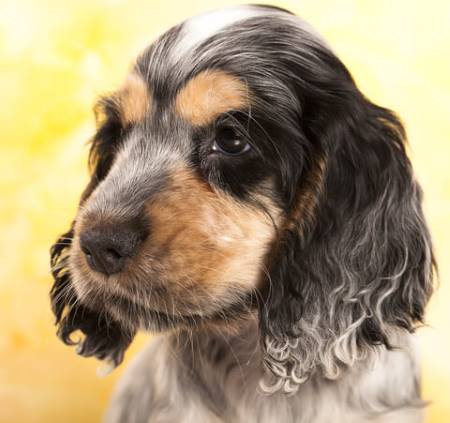 Cocker Spaniel puppy care advice and tips!
Cocker Spaniel puppy care advice and tips!In order to do that, puppies need boundaries and guidelines. If you don't give them that, they will do as they please; they don't know any better.
We need to show them how we would like them to behave. That's why we, as owners, must teach our puppies all we can. Let's get started, shall we?
Cocker Spaniel Puppy Care Guide: Your Puppy's Daily Activities
-
-
-
-
-
-
-
-
-
-
when and how long, essential to new-born puppy development;
nutritious food to keep your pup strong and healthy;
step-by-step potty training to help keep your puppy dry;
vital to your puppy's confidence and happiness;
your puppy should be used to being handled every day;
teach your puppy to enjoy his grooming sessions!
stimulate your puppy’s mind with lots of fun playtimes!
he may only be little, but he still needs exercise.
obedience - teach your puppy what's right and wrong.
learn how to teach your puppy to love his crate!
Cocker Spaniel Puppy Care: Let Him Sleep!
During those first few months, your puppy will take lots of power naps. You don't need to worry about this. Your puppy is growing at a fast rate of knots, and sleeping will help your pup grow; bones, organs, brain, etc., are developing.
Sleeping is essential to your puppy's overall development at this young age, so let him sleep when necessary. Don't be tempted to wake him for a cuddle! (I know it's not easy!).
As your Cocker pup ages, he'll need less sleep during the day and do more of what puppies do best; exploring and getting up to mischief! So make the most of these precious puppy days and enjoy watching your quiet little cherub sleeping while you can!
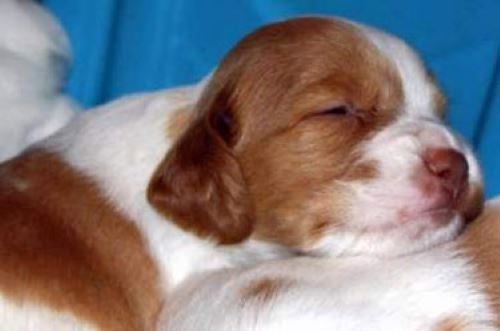 Quiet, please; I'm growing up to be a big boy!
Quiet, please; I'm growing up to be a big boy!Cocker Spaniel Puppy Care: Crating Your Puppy Is Not Cruel!
If you haven't already considered it, I recommend that you crate-train your puppy.
At first, many new owners think it's unkind (cruel even) until they hear the benefits of crating their puppy. They soon realise that a dog crate is a very secure place for their puppy, offering them many benefits.
As part of your Cocker Spaniel puppy care routine, put your pup into his crate after an activity, for example, after eating, playtime, or training (but don't forget to let him go potty first!).
After any exertion or excitement, your puppy will probably be tired. Give him a little cuddle first to help him relax, then put your puppy into his new crate; it won't be long before he drops off to sleep.
While your pup is in his crate, check on him occasionally to ensure he's still asleep, especially if he's not fully house-trained yet, because the first thing your puppy will want to do when he wakes is pee!
When you see him stir, immediately take him outside to his toilet area and encourage him to 'go potty'. Remember to praise him if he pees outside, which lets him know that he did exactly what you wanted him to do.
Cocker Spaniel Puppy Care: Bedtime Routine
I get many questions about a puppy's bedtime routine during the first few nights at their new home. So, I added a link (above) which will take you to an article about a new puppy's night-time sleeping to give you a few ideas.
New Puppy Care & Feeding
Regular feeding times are an essential part of your Cocker Spaniel puppy care routine.
I don't recommend free-feeding your puppy as it can cause many problems, including digestive irregularity and obesity, especially if you have a greedy little puppy!
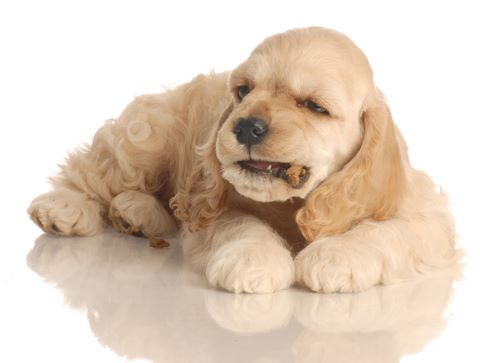 Free-feeding your puppy isn't recommended
Free-feeding your puppy isn't recommendedIf your puppy always has access to food, it can complicate training, leading to a puppy not being motivated by food.
Don't be tempted to feed him between meals either; a few treats given as a reward for successful puppy training sessions should be the only exception here.
Feeding your puppy with the best nutritious dog food you can afford right from the start is vital if your puppy is to grow strong and healthy.
Always follow the breeder's feeding instructions or the food manufacturer's recommendations.
Ensure your puppy has plenty of fresh water in his bowl each day, and it's topped up when necessary; this is especially important if you feed your puppy kibble because it doesn't contain much water.
Feeding stimulates a puppy's bowels, so you may need to take him outside again after he's finished eating; in fact, it's advisable to do so!
Potty Training Your Puppy
Your puppy's young bladder won't yet be strong enough to hold off for long, making it highly likely that he'll pee as soon as he wakes up.
While you're going through the potty training phase, taking him outside as soon as he wakes is essential. Your goal here is to help him to avoid having little accidents indoors; don't let peeing indoors become a habit, as habits are often hard to break.
If your puppy uses a crate, he will try to avoid doing his business 'on his doorstep'. If your puppy is in his crate, he'll try very hard not to pee inside his crate, but if he can't hold it, that's where he'll pee!
The upside of this is no more puddles or little parcels on your clean kitchen floor!
When your puppy has an accident, please don't scold him. If your pup has already messed up, don't blame him. He can't help it; it will be your fault as you weren't there to let him out.
Always check your puppy's poop. The consistency of puppy poop is often an indicator of your puppy's health; diarrhoea in puppies can be a cause for concern, so it's wise to be aware.
It's down to us as 'doggie mums and dads' to ensure we take our puppy outside at every opportunity.
Stay outside with him until he's done his business. Encourage him to do his toilet, and praise him like a mad thing (enthusiastically) if he pees or poops before bringing him back inside.
While he's still young, you'll need to take your Cocker puppy outside many times a day, at least hourly. You'll need to do this until your Cocker Spaniel puppy understands that you want him to do his business outside, not in your home, and he's fully house-trained.
Here is an article with information and advice on potty training your puppy.
Cocker Spaniel Puppy Care & Socialization
You may not have heard of the word 'socialization' used in the context of puppies. However, it's essential to your puppy's development, and you should understand your role as a puppy parent.
Socialization is getting your puppy used to his new human world's sights, sounds and smells. It will help him to become confident and happy and allow him to develop to his full potential.
I cannot stress how important socialization is for all puppies.
Your breeder will begin socializing your puppy while he is still with his mother. It's vital to your Cocker's development that you continue with this socialization until he's at least 12 months old.
Please don't put it off, as you'll only have a short window; socialization of puppies is most effective between 6 to 12 weeks.
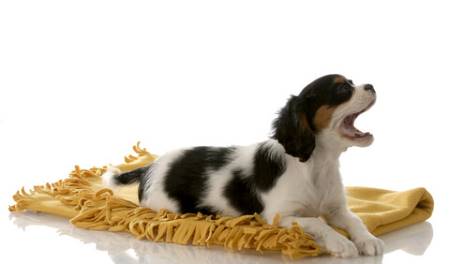 Copyright: Cynoclub
Copyright: CynoclubEncourage your little boy to explore his new environment.
As part of his early socialization, you must expose your puppy to everyday household domestic appliances, such as vacuum cleaners, hair dryers, washing machines, and coffee grinders.
Familiarising your puppy with these household items will help him get used to sudden noise, light and vibration.
Your puppy should also meet many people in different situations, such as small children playing, crying babies, men and women in uniforms, men with beards, people with umbrellas, and more. The list is almost endless.
I can't stress enough that socializing your Cocker Spaniel is crucial to any puppy care routine.
IMPORTANT NOTE: Puppies adequately socialized are more likely to grow up to be well-adjusted, confident, happy Cocker Spaniels.
Puppies that aren't socialized, or have too little socialization, may become very timid or, conversely, aggressive and could develop behavioural problems later in life.
Cocker Spaniel Puppy Care & Separation Anxiety
Puppies don't like to be left home alone, and many suffer separation anxiety if left on their own for long periods. Witnessing your puppy becoming distressed each time you go out without him is heartbreaking.
You'll know if your puppy is anxious or distressed when left alone because there are many unpleasant symptoms of separation anxiety, such as:
- chewing anything and everything in sight except his own toys
- barking, howling or whining
- 'digging' on the sofa, floors, chairs
- pacing backwards and forwards
- panting
- peeing and pooping indoors
And many more.
Distressed or bored puppies can lead to destructive behaviour.
The good news is that you can teach your puppy to be content when left alone for short periods. You can manage your puppy's separation anxiety!
Puppy Care & Handling
Puppies that are regularly handled (gently, of course) will be better socialized than those that are not and, as a result, are less likely to develop behavioural problems later in life.
You, your family and friends (the more, the merrier!) must pick up and cuddle your puppy at every opportunity so that he gets used to being handled by people.
Now I don't think that'll be too difficult, do you? Puppies are so darned cute!
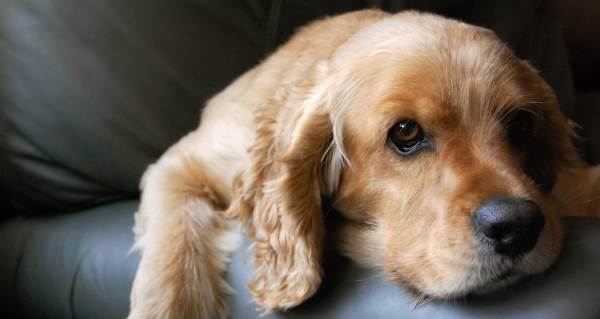 Copyright: Jeff Dutton
Copyright: Jeff DuttonWhile you're handling your pup, talk to him. If you've already chosen his name, speak it while you pet him so that he becomes used to your voice and his name.
Examine and touch all areas of your puppy regularly. Touch your puppy's eyes, ears, mouth, teeth, bottom and 'boy bits', tummy button, and paws, especially his front paws.
Frequent handling of your puppy will help him become accustomed to human touch. Handling your puppy in this way will pay dividends later in life, for example, when your groomer needs to work on him, or your vet needs to examine him.
Puppy Care & Grooming
I recommend you start grooming your puppy from day one.
Of course, he's too young to need grooming just yet; however, getting your pup used to being groomed is essential if he is to sit quietly for you or your groomer when his feathers arrive and his coat has fully grown in.
If you familiarise him with grooming tools while he's young, he won't be startled by any of them later when it's time to groom him for real.
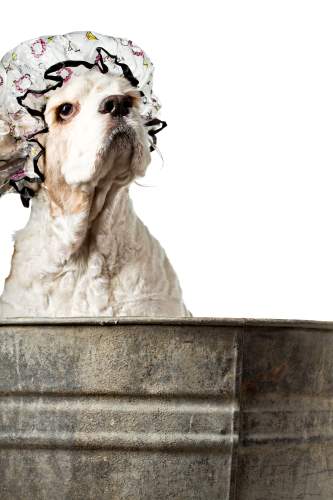 Copyright: Debbi Smirnoff
Copyright: Debbi SmirnoffYour puppy will need bathing occasionally, and how often will depend upon where he plays, where he's walked, and how dirty he gets.
It's best to get him used to this while he's still a young pup because if you leave it until he's a fully grown dog before bathing him, you may be in for a challenging time!
Discover the best way to bathe your puppy without tears and tantrums!ing
Puppy Care & Teething
When your little puppy's new teeth come through, they can cause a lot of pain for him, which may cause him to start biting and chewing on anything he can to help relieve his pain.
Naturally, you'll want to help your buddy ease his pain by giving him specially designed teething toys and rings to chew on.
So, if you catch him chewing something you don't want him to chew on, exchange it for one of his chew toys. He'll soon get the message, learning that he can happily chew, so long as it's one of his toys.
If he's not 'getting the message' and still chewing (your new shoes or your favourite slippers!), here are some helpful tips to help stop your puppy from chewing.
And if it's your fingers (or any other part of you) that he's biting, you can learn how to stop your puppy from biting here.
And while we're still on the subject of puppy teeth, when they do eventually come through, you'll need to help him keep them clean by brushing them regularly.
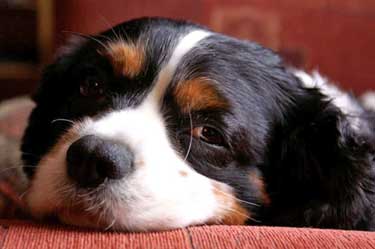 I'm teething, and my gums are sore!
I'm teething, and my gums are sore!Unfortunately, the practicality of brushing his teeth may sometimes be more complex. Anyone who has tried brushing their dog's teeth will know what I mean!
However, if you take a very gentle approach, your pup will gradually become used to the feel of a toothbrush in his mouth and will soon learn to sit without squirming while you brush.
Start brushing your puppy's teeth as early as possible to help him get used to the feel of his teeth and gums being brushed and massaged as part of his regular grooming routine.
At first, you may need to persevere, but once you and your pup get used to it, you'll wonder what all the fuss was about!
Puppy Care & Playtime
Besides being fun for all, puppy play is an ideal way to give your pup the physical and mental stimulation he needs.
Some of our favourite puppy games include; Fetch It, Tug of War (but with caution), Find It!, Hide and Seek, and Chase Me!
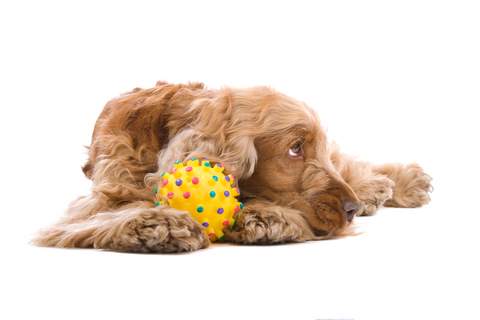 Come on, Mum; it's time to play again!
Come on, Mum; it's time to play again!We also play 'hide the treats', currently our favourite game. I ask Max to sit and stay while I hide treats around the house (tiny dog treats - I don't want him to become chubby!).
When I've hidden all the treats, I release him by saying, 'Go find them,' and he's off like a rocket!
We also play fetch with his ball until one of us gets tired – guess which of us gets tired first?
Believe it or not, playing games doesn't always come naturally to all puppies; sometimes, they need to learn how to play puppy games!
Puppy Care & Exercise
Exercise is essential to your puppy's well-being.
If your puppy has yet to be fully vaccinated, you won't be able to exercise him in your local park. However, he must exercise every day.
You can do this in lots of ways, for example:
- You already know that you can teach him some puppy games and get him running around your home;
- You can play with your puppy in your garden, but ensure it's secure.
Check for gaps in the fencing that your puppy could squeeze through, and close them off. Check there are no poisonous plants in your garden.
If your garden's not fully enclosed, I recommend you use a long training lead to allow your Cocker puppy to run about safely.
Always stay with your puppy; don't leave him alone in your garden; you can't be too careful! - Obedience training sessions will help to exercise him, both mentally and physically;
- Once he's old enough to go into public places (usually after the final vaccination at 12 weeks old – your vet will advise you), the sky's the limit!
While you're waiting, you can teach your puppy to walk on a leash in your garden.
Walkies anyone?
Puppy Care Tips: Summary
What should your puppy's day look like?
Your puppy will thrive if all of the above activities are included in your Cocker Spaniel puppy care routine three or four times daily.
As your fur baby develops and becomes fully house-trained, he'll still need a regular puppy care routine, but it won't be nearly as busy as the one above.
Use your judgement on this one, as puppies are little individuals (just like our children); they often develop in different ways and at different rates.
If you have any pressing concerns about puppy care or your puppy's health, don't put them off to see how they get on. Get in touch with your vet or veterinary nurse as soon as possible.
Puppy Care Questions, Questions, Questions!
You may have many questions tumbling around in your head, such as;
- What do I feed my new puppy, and when and how much do I feed him?
- What else will my Cocker puppy need apart from a bed?
- How do I train my new Cocker?
- My puppy is eating poop! How can I stop him?
- How do I potty-train my puppy?
You'll find answers to these questions by following the links.
Cocker Spaniel Puppy Care: His Daily Routine
Setting up a good puppy care schedule will give your Cocker Spaniel puppy a sense of comfort and well-being.
To give you an idea of what your puppy's daily routine should look like, here's my handy guide to your puppy's daily care.
I'm sure you'll find it invaluable!
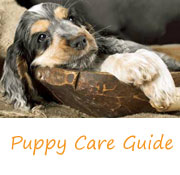
Puppy Obedience Training
|
A well-behaved, happy, obedient Cocker Spaniel puppy is a joy to see. Learn how to train your puppy and help to teach your little man (or lady) some good manners! What a good boy! |
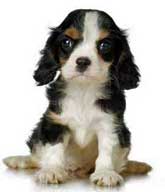 What a good boy! What a good boy! |
Photo credits for Cocker Spaniel Puppy Care:
1. Lilun at https://www.dreamstime.com/royalty-free-stock-images-puppy-english-cocker-spaniel-image23622039
2. https://morguefile.com/p/30185
3. Willeecole at http://www.dreamstime.com/stock-image-puppy-eating-dog-food-image7070021
4. Cynoclub at https://www.dreamstime.com/royalty-free-stock-photo-puppy-barking-laying-blanket-image12996225
5. jeff Dutton at https://www.freeimages.com/photo/boston-1368212
6. Debbi Smirnoff at https://www.istockphoto.com/photo/bath-time-gm184294400-17030543
7. JulesInKY at https://morguefile.com/p/126277
8. Erik Lam at http://www.dreamstime.com/royalty-free-stock-photo-cocker-spaniel-image9145715








